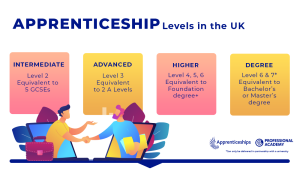Working With Students: Placements, Internships, Apprenticeships
Placements, apprenticeships, and internships serve as valuable pathways for both personal and professional growth. They benefit both employers and people seeking work experience.
Understanding the Options: Placements, Internships & Apprenticeships
University undergraduates apply their classroom learnt, industry skills, in a real work environment in a chosen area as part of their degree course whilst they break from their studies. Usually, the student will choose a field that is closely related to their degree. Once the placement is over, the student then returns to complete their final year of a degree but is armed with work experience and practical know-how when they hit the employment market after graduation. Work placements are a great way to develop skills and build experience and can really support students to secure a full -time job in the sector in future.
- Placement roles are dictated by the organisation and where a gap exists. Organisations will identify the area where they need extra resources and ensure that there is enough work to occupy the student for the required amount of time. The placement is a learning experience for the student and the role needs to fulfill this and offer enough professional development experience.
- Placement can be a varying period of time. They can be a few weeks, a few months or a full year.
- All placements should be supervised and there is usually set requirements and standards for supervisions and assessments. Supervision doesn’t necessarily have to be done internally. Long arm supervisions can also take place.
- For quality assurance organisations and placements are usually audited.
Apprentices receive a wage while gaining practical skills and knowledge related to a specific industry or occupation. Apprenticeships lead to nationally recognised qualifications. The goal is to provide a structured pathway for individuals to develop the skills needed for a particular job. Apprenticeships are available in various industries and offer a valuable means of skills development and workforce preparation.
- An apprenticeship is a real job available to individuals aged 16+ (with no upper age limit)
- All apprenticeships are paid a salary of at least the national minimum wage for apprentices. Many employers pay more.
- Apprenticeships can last between 1 and 4 years to complete. It will depend on the level and the delivery model of the apprenticeship.
- Apprenticeships can range from level 2 to level 7. There are apprenticeships at levels equivalent to GCSE’s right up to Masters level and you can now achieve a degree through an apprenticeship.
- Apprentices do not pay for their training. All costs are paid for by the employer and/or the government.
- Apprentices receive 20% ‘off the job’ training. This is paid time spent taking off-the-job learning, gaining valuable skills and qualifications.
- Apprentices spend 80% on the job training. This time is spent on the job working with colleagues to learn new skills and gain experience of the workplace.
Understanding the Options: Placements, Internships & ApprenticeshipsAn internship typically involves practical work experience offered by employers to students or recent graduates. They are designed to provide individuals with the opportunity to gain hands-on experience in a specific industry, field, or profession. These opportunities may be integrated into academic programs, required for professional qualifications, or pursued voluntarily.
- An internship is a short-term work placement that usually lasts from a few weeks to a few months
- They can be paid or unpaid.
Why Work with Students?
There are huge benefits to offering students a role within your organisation. Offering students opportunities will really help to increase awareness and the value of the VCSE sector and will support in increasing the diversity of our workforce.
A work placement benefits both the student and the employer. Aside from the cost-savings of hiring a student, there are numerous other benefits for organisations including:

